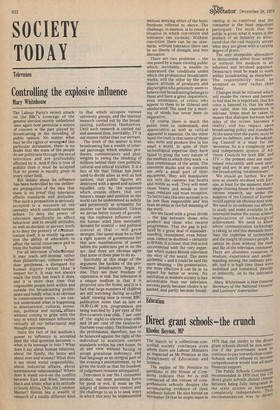Education
Direct grant schools — the crunch
Rhodes Boyson, MP
The march to a collectivist-controlled society continues even where there are Labour Ministers as respected as Mr Prentice at the sDceiepnacrem. t ent of Education and
The replies of Mr Prentice to questions in the House of Commons indicate that he is still convinced of the virtues of comprehensive schools despite the accumulating evidence of their academic failure. He also hinted on November 19 that he might insist in
1976 that the intake to the direct grant schools should be non-selective if the government were to continue to pay towards their costs. Schools which refused to become compratensive would lose all state financial support. The Public Schools Commission recommended in 1970 that the 178 direct grant schools should choose between being fully integrated in the state system or becoming completely independent. This recommendation was in direct
contrast with the first report of the Public Scliools Commission in 1968 which had favoured .the linking of the independent schools with the state system. Most of us, however have ceased long ago to have much faith in the logic of Royal Commissions. Any form of mixed system in economics, education or health is now seen by the Labour Party as a direct threat to the state system because of the increasing failure of the latter for all to see.
The direct grant schools which cater for some 100,000 pupils are academically the most successful of all English schools. Thirty-six per cent of their pupils go to university compared with eighteen per cent from grammar schools and four per cent from comprehensive Schools. They send a higher percentage of their pupils on to Oxbridge than do the public schools. Some sixty of their heads are members of the Headmasters' Conference. Fifty-six of the schools are Roman Catholic and they have a wider social mix than have the independent schools or many neighbourhood comprehensive schools.
Each direct grant school promises to make at least a quarter of its places available as free places to children who have attended a grant-aided primary school for at least two years. These may be offered by the Governors as 'scholarships' or through one or more local authorities on the results of their local 11-plus examination. Further reserved places up to a total of 50 per cent may be taken by the local authorities. The remaining Places, known as residuary places, are awarded on the schools' own examinations, but although these are normally known as fee-payers, there is a scale of fees graded according to the parental income so that there is no financial bar to entry of children from poor homes. The Department of Education makes up the difference between scale fees and full fees so that only some twenty-five per cent of a direct grant school's income comes from levied fees on parents. The
• govern grant per pupil was raised to £79 in November 1972 by Mrs Thatcher. There is an additional £84 grant for sixth formers.
Some direct grant schools have endowments which enable them to be even more generous. Queen Elizabeth's Hospital, Bristol, even has 50 free foundation boarding scholarships. Fifteen of the other boarders also pay no fees. Of the 18() fee-paying day boys only 34 pay the full fee. There are also a further 70 day boys entirely free on the foundation, and others paid for by the local education authorities.
Such schools probably do at least aS much for many of the bright boYs from deprived homes as did the grammar• schools. Ernest Barker, the miner's son who through Manchester Grammar 1Slch001 went to university and ,ecame 'Professor of Political ,conomy at Cambridge, wrote of IS school: at a mother it was! It gave me a great drill and a stirring stimulus.... It taught
to work, to read and to think. It gave Ine great friendships. It filled me entirely end utterly for the space of seven years.
Outside the cottage I had nothing but school, but having the school I had everything.
The earlier socialist was attracted to the idea that each boy only paid according to his income. Such socialists remembered early socialist ideals that each was to give according to his means. Any form of social mobility is, however, now resented by the millenialist left who only pretend they want equality of opportunity. They really want total state control, no untidy or mixed systems and the subjection of all people to their way-out theories. Most present day left wingers are concerned with dogma not people.
Let no one in the public or independent or preparatory school system think that the tolling of the bell for the direct grant schools is not also tolling for them. The fall of the grammar schools brought our modern barbarians to the foothills of the direct grant schools. The fall of the direct grant schools will bring them to the public schools. Neither the need for academic standards nor individual freedom will stand in the way of our modern levellers.
Mr Prentice was quoted as saying last May, "Certainly, we should like to see the private sector integrated and become fully comprehensive but this will take time."
That time is coming and unless all schools and parents fight and the Conservative Party through the voucher or some such scheme offers choice to all parents then the last independent school could fall in our time. You can drown a man in seven feet of water as easily as in twenty feet and you can bury him as effectively over a number of years as in one. Mr Prentice is tolling the bell slowly but it is ringing loudly and persistently. .
Dr Rhodes Boyson, formerly headmaster of the Highbury Grove School, is Conservative mp for Brent















































 Previous page
Previous page